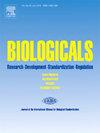Conference report WHO informal consultation on the draft WHO Guideline on the phasing out of animal tests for the quality control of biological products
IF 1.5
4区 生物学
Q4 BIOCHEMICAL RESEARCH METHODS
引用次数: 0
Abstract
Animal testing has long supported the development and quality control of biotherapeutics and vaccines by ensuring safety and efficacy. However, its variability and time-consuming nature can delay product availability. Advances in non-animal technologies, guided by the 3Rs principles, have led to more efficient and scientifically robust alternatives. Recognizing the limitations of animal assays, WHO encourages their replacement when scientifically justified and has drafted a Guideline on phasing out animal tests in biological product quality control. Following public consultation, an informal meeting at WHO Headquarters brought together regulators, industry representatives, and other stakeholders to review the draft. The Guideline was developed based on ECBS recommendations and a review of existing WHO documents. Participants proposed improvements, including a revised title, to better emphasize the scientific rationale for replacing animal-based tests used in quality control scheme. These updates aim to support finalization of the document for a second public consultation and ECBS adoption.
世卫组织关于逐步淘汰用于生物制品质量控制的动物试验的准则草案的非正式协商会议报告
长期以来,动物试验通过确保安全性和有效性来支持生物疗法和疫苗的开发和质量控制。然而,它的可变性和耗时的性质会延迟产品的可用性。在3r原则的指导下,非动物技术的进步带来了更有效、更科学的替代品。认识到动物试验的局限性,世卫组织鼓励在科学证明的情况下替代动物试验,并起草了一份关于在生物制品质量控制中逐步淘汰动物试验的指南。在公众咨询之后,世卫组织总部举行了一次非正式会议,监管机构、行业代表和其他利益攸关方齐聚一堂,审查该草案。该指南是根据欧洲安全委员会的建议和对世卫组织现有文件的审查制定的。与会者提出了改进意见,包括修订题目,以便更好地强调取代质量控制方案中使用的基于动物的试验的科学依据。这些更新旨在支持文档的最终定稿,以进行第二次公众咨询和ECBS采用。
本文章由计算机程序翻译,如有差异,请以英文原文为准。
求助全文
约1分钟内获得全文
求助全文
来源期刊

Biologicals
生物-生化研究方法
CiteScore
3.70
自引率
0.00%
发文量
39
审稿时长
48 days
期刊介绍:
Biologicals provides a modern and multidisciplinary international forum for news, debate, and original research on all aspects of biologicals used in human and veterinary medicine. The journal publishes original papers, reviews, and letters relevant to the development, production, quality control, and standardization of biological derived from both novel and established biotechnologies. Special issues are produced to reflect topics of particular international interest and concern.Three types of papers are welcome: original research reports, short papers, and review articles. The journal will also publish comments and letters to the editor, book reviews, meeting reports and information on regulatory issues.
 求助内容:
求助内容: 应助结果提醒方式:
应助结果提醒方式:


